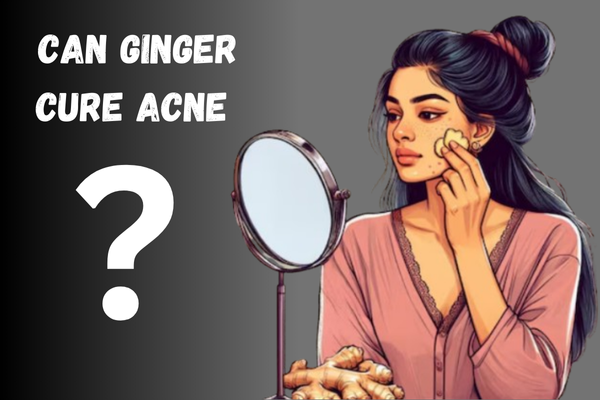Does Rubbing Raw Ginger Cure Acne? Here's What Dermatologists Say

Introduction
Social media is filled with DIY skincare hacks, but do they all really work? The latest trend circulating on Instagram claims that rubbing raw ginger on your skin can cure acne. But is there any truth to this, or is it just another viral myth? Let’s break it down with expert opinions and scientific facts.
Table of Contents
What’s the Buzz About Ginger and Acne?
Influencers and skincare enthusiasts are claiming that rubbing raw ginger directly on acne breakouts can help clear them up instantly. Videos showing people with glowing skin crediting this spice for their transformation are everywhere. But before you rush to your kitchen, let’s analyze whether this actually works.
What Do Dermatologists Say?
Not Everything Natural is Good for Your Skin
Just because something is natural doesn’t automatically mean it’s safe to apply directly to your skin. Dermatologists warn against using raw ginger as a direct treatment for acne.
Dr. Gulhima Arora, Senior Consultant Dermatologist, states: “Ginger has proven benefits for acne in scientific studies, but not in the way people on social media claim. It should not be considered a first-line treatment.”
Dr. Saranya B, Dermatologist and Medical Advisor, agrees: “There is no scientific evidence supporting the application of raw ginger for acne. While it has antibacterial and anti-inflammatory properties, direct application may cause irritation.”
Dr. Bindu Sthalekar, Founder of Skin Smart Solutions, adds: “At best, it can be an add-on to a skincare routine if tolerated well, but it is not a cure.”
Does Ginger Have Any Benefits for Skin?
While rubbing raw ginger may not be the best idea, incorporating it into your skincare in a controlled way can offer some benefits:
1. Anti-Inflammatory and Antibacterial Properties
Ginger contains gingerol and shogaol, which have anti-inflammatory and antibacterial effects. These can help reduce redness and swelling associated with acne.
2. Rich in Antioxidants
Ginger helps combat free radicals, preventing oxidative stress that can accelerate aging and worsen acne-prone skin.
3. Supports Gut Health
A healthy gut is linked to clearer skin. Ginger acts as a prebiotic, promoting good bacteria, which may indirectly benefit acne-prone individuals.
4. Helps Control Oil and Fades Scars
Some studies suggest that ginger can regulate sebum (oil) production, which might help with acne control.
It may also aid in fading acne scars over time when used in diluted formulations.
Why Rubbing Raw Ginger Can Do More Harm Than Good
1. Alters Skin’s pH Balance
Dr. Arora warns that raw ginger is alkaline and can disturb the skin’s natural barrier, leading to increased breakouts.
2. Causes Skin Irritation and Allergic Reactions
Dr. Saranya B explains that ginger’s strong compounds can trigger irritation, excessive dryness, burning, and even allergic reactions.
3. Leads to Contact Dermatitis
Dr. Sthalekar highlights that the high concentration of essential oils in raw ginger may cause irritant contact dermatitis, leading to more skin issues rather than solving them.
How to Safely Use Ginger for Acne?
If you still want to reap the benefits of ginger, here are some safer ways to incorporate it into your routine:
1. Consume Ginger for Internal Benefits
Drinking ginger tea or adding ginger extracts to your diet can help fight inflammation from within.
2. Use Skincare Products with Ginger Extracts
Opt for products containing measured amounts of gingerol or shogaol, as they are formulated to be gentle on the skin.
3. Dilute Ginger Before Applying to Skin
Mix ginger extract with carrier oils (like jojoba oil), honey, or glycerin to reduce the risk of irritation.
Always perform a patch test before applying anything new to your skin.
Final Thoughts: Is the Instagram Hack Worth Trying?
The verdict? No, rubbing raw ginger is not a safe or scientifically proven acne treatment. While ginger has many skin benefits, they are best obtained through diet or controlled skincare formulations. Instead of following viral trends, opt for dermatologist-approved treatments for safe and effective results.
Frequently Asked Questions (FAQs)
1. Can I use ginger juice on my face instead of raw ginger?
Yes, but only when diluted with a carrier oil, honey, or aloe vera to reduce irritation.
2. How long does it take for ginger to show results for acne?
Ginger’s anti-inflammatory properties may take a few weeks to show results when consumed or used in skincare.
3. What are some alternatives to ginger for acne treatment?
Dermatologist-approved treatments like salicylic acid, benzoyl peroxide, and niacinamide are more effective for acne.
4. Does drinking ginger tea help with acne?
Yes, ginger tea can help reduce internal inflammation, which may contribute to clearer skin over time.
5. What should I do if I experience irritation from ginger?
Immediately rinse your skin with water and apply a soothing ingredient like aloe vera or cold milk to reduce irritation.
